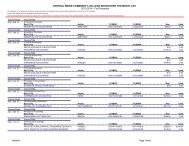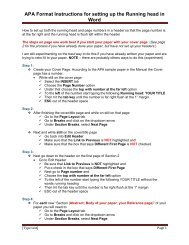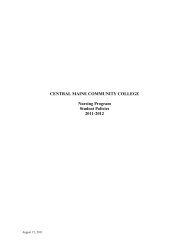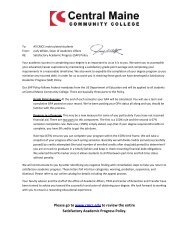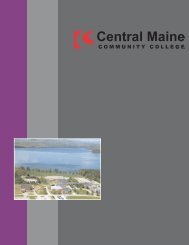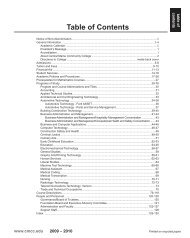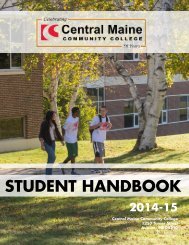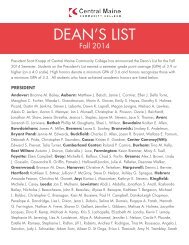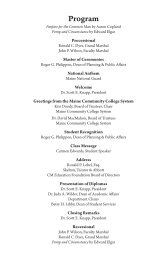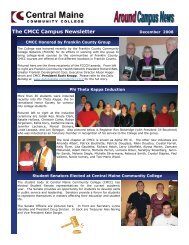Academic Policies and Procedures - Central Maine Community ...
Academic Policies and Procedures - Central Maine Community ...
Academic Policies and Procedures - Central Maine Community ...
Create successful ePaper yourself
Turn your PDF publications into a flip-book with our unique Google optimized e-Paper software.
Course Descriptions<br />
course<br />
descriptions<br />
retical concepts <strong>and</strong> practical skills. The course<br />
will include practical exercises in the vari ous<br />
techniques <strong>and</strong> methods specifically used in the<br />
human services fi eld. Prerequi sites: Completion<br />
of HUS 112 <strong>and</strong> PSY 101, with a grade of C or<br />
better or instructor permission.<br />
PSY 201 Social Psychology<br />
3 Credits (3 Lecture 0 Lab 0 Shop)<br />
3 Hrs/Wk (3 Hrs. Lecture) *15 wks<br />
This course will examine individual human behavior<br />
in social contexts. The cognitive, symbolic<br />
interaction, exchange, role-refer ence group,<br />
<strong>and</strong> dramaturgical approaches are explored.<br />
An emphasis will be placed on language <strong>and</strong><br />
communication, inter group conflict <strong>and</strong> conflict<br />
resolution , social judgments <strong>and</strong> decisions attitudes,<br />
perceptions of others, social influence,<br />
attraction, aggression, <strong>and</strong> group pressure.<br />
PSY 202 Developmental Disabilities <strong>and</strong><br />
Psychosocial Rehabilitation<br />
3 Credits (3 Lecture 0 Lab 0 Shop)<br />
3 Hrs/Wk (3 Hrs. Lecture) *15 wks<br />
This course will present an overview of current<br />
theoretical <strong>and</strong> philosophical perspec tives<br />
relating to the day-to-day problems of those<br />
with mental, physical <strong>and</strong> develop mental disabilities<br />
including mental retarda tion, autism,<br />
cerebral palsy, epilepsy, TBI <strong>and</strong> other nervous<br />
symptom disorders. The rehabilitation process<br />
will be exam ined, including the history <strong>and</strong><br />
background, legislation, basic principles <strong>and</strong><br />
philosophy. Also considered are the steps in the<br />
reha bilitation process, historical attitudes toward<br />
people with disabilities, the medical model <strong>and</strong><br />
independent living programs. Course content<br />
<strong>and</strong> activities will enable students to recognize<br />
ways in which dis ability affects individuals as<br />
members of families, groups, organizations<br />
<strong>and</strong> com munities. Course focus will also be on<br />
exploring techniques used in various life stages<br />
<strong>and</strong> reviewing innovative ways to overcome<br />
apathy <strong>and</strong> discrimination in populations. Additional<br />
focus will be on developing the knowledge<br />
<strong>and</strong> basic skills necessary for rehab goal planning,<br />
func tional assessment, <strong>and</strong> direct skills<br />
teach ing along with job development, analysis,<br />
matching <strong>and</strong> retention. Major emphasis is given<br />
to the operation of the state voca tion/federal<br />
system. Ethical <strong>and</strong> legal issues such as selfdetermination,<br />
strate gies for independence <strong>and</strong><br />
nondiscrimina tion will be addressed.<br />
PSY 204 Vocational Aspects of Disability<br />
<strong>and</strong> Vocational Rehabilitation Counseling<br />
3 Credits (3 Lecture 0 Lab 0 Shop)<br />
3 hrs/wk (3 Hrs. Lecture) *15 wks<br />
The purpose of this course will be to present a<br />
survey of the historical, sociological, theoretical,<br />
legislative <strong>and</strong> operational foundation of vocational<br />
rehabilitation counseling <strong>and</strong> service delivery<br />
along with the vocational aspects of disability.<br />
Specifically how these issues relate to persons<br />
with disabilities, to include, physical, intellectual,<br />
behavioral <strong>and</strong> psychological will be addressed.<br />
Students will examine <strong>and</strong> analyze philosophical,<br />
historical, legislative <strong>and</strong> organizational structures;<br />
vocational rehabilitation <strong>and</strong> related programs;<br />
referral <strong>and</strong> service delivery systems; the<br />
vocational rehabilitation process; administration<br />
of rehabilitation programs <strong>and</strong> professional <strong>and</strong><br />
ethical issues. Prerequisites: PSY 101 <strong>and</strong> HIS<br />
112 with a grade of “C” or better.<br />
PSY 210 Behavior Analysis <strong>and</strong><br />
Management<br />
3 Credits (3 Lecture 0 Lab 0 Shop)<br />
3 Hrs/Wk (3 Hrs. Lecture) *15 wks<br />
This course presents a framework for observing,<br />
analyzing, <strong>and</strong> managing behavior. The principles<br />
of operant condi tioning will be discussed, emphasizing<br />
ways the environment can be managed so<br />
that the individual’s behaviors can be man aged<br />
within family, school <strong>and</strong> other social services<br />
agencies, <strong>and</strong> work settings. Pre requisite: PSY<br />
101 or instructor permission.<br />
PSY 212 Abuse, Trauma <strong>and</strong> Recovery<br />
3 Credits (3 Lecture 0 Lab 0 Shop)<br />
3 Hrs/Wk (3 Hrs. Lecture) *15 wks<br />
This course examines human adaptations to<br />
traumatic events including various types <strong>and</strong><br />
sources of violence <strong>and</strong> abuse. The historical<br />
<strong>and</strong> social contexts in which abuse <strong>and</strong> trauma<br />
are identified will be explored. Stages of recovery,<br />
<strong>and</strong> an inter vention framework for the human<br />
service worker with traumatized people<br />
will be examined. Topics included: domestic<br />
vio lence, sexual abuse, workplace violence of<br />
people over the life course. Prerequisite: HUS<br />
112 with a grade of C or better or instructor permission.<br />
PSY 296 Special Topics in Psychology<br />
3 Credits (3 Lecture 0 Lab 0 Shop)<br />
3 Hrs/Wk (3 Hrs. Lecture) *15 wks<br />
The students in this course will analyze selected<br />
topics in psychology. These topics will analyze<br />
various individual <strong>and</strong> social patterns in contemporary<br />
psychology. The special topic analyzed<br />
is not a regular course offering of the social<br />
sciences department. Since the topic covered<br />
in this class differs from year to year, students<br />
should seek further information from the instructor<br />
before registering regarding the particular<br />
topic that will be analyzed. Possi ble areas to<br />
be analyzed include: counsel ing, industrial organizational,<br />
professional issues <strong>and</strong> ethics,<br />
research methods, cog nitive, developmental,<br />
family, social, <strong>and</strong> general. Possible topics to be<br />
addressed include: close relationships, personality,<br />
abnormal psychology <strong>and</strong> diagnosis, <strong>and</strong><br />
persuasion.<br />
Real Estate (REE)<br />
REE 101 Sales Agent Course: Real Estate<br />
4 Credits (4 Lecture 0 Lab 0 Shop)<br />
4 Hrs/Wk (4 Hrs. Lecture *15 wks<br />
This course provides the student with suffi cient<br />
competency in Real Estate to sit for the <strong>Maine</strong><br />
Real Estate Commission Sales Agent Exam.<br />
Students who successfully complete this course<br />
can apply for the exam. Topics will include<br />
license <strong>and</strong> con tract law, the listing process,<br />
types of mort gages, real estate math, <strong>and</strong> the<br />
negotiating <strong>and</strong> closing process. This course is<br />
subject to annual review <strong>and</strong> approval by the<br />
<strong>Maine</strong> Real Estate Commission.<br />
Religion (REL)<br />
REL 101 Comparative Religion<br />
3 Credits (3 Lecture 0 Lab 0 Shop)<br />
3 Hrs/Wk (3 Hrs. Lecture) *15 wks<br />
Are religious beliefs vastly different from one another?<br />
Are they a major cause of strife around<br />
the world or a source of peace? Where are the<br />
similarities? Can religions even exist in our hectic<br />
21st Century world? Can science <strong>and</strong> religion<br />
coexist? Does God even exist? Comparative<br />
religions will look for answers by examining the<br />
major religious traditions of the world. From the<br />
West – Christianity, Judaism, Islam. From the<br />
East – Hinduism, Buddhism, Taoism. In addition,<br />
we’ll explore some of the lesser known beliefs<br />
such as Native American beliefs, Paganism,<br />
Wicca, Scientology, <strong>and</strong> others. We’ll be following<br />
a text, but the course will also include several<br />
primary sources <strong>and</strong> religious documents for a<br />
more comprehensive underst<strong>and</strong>ing. Prerequisites:<br />
Successful completion of both a) CMCC<br />
writing assessment, or ESL 101 or instructor<br />
permission, <strong>and</strong> b) CMCC reading assessment<br />
of ENG 050.<br />
www.cmcc.edu 2010 ~ 2011 115



